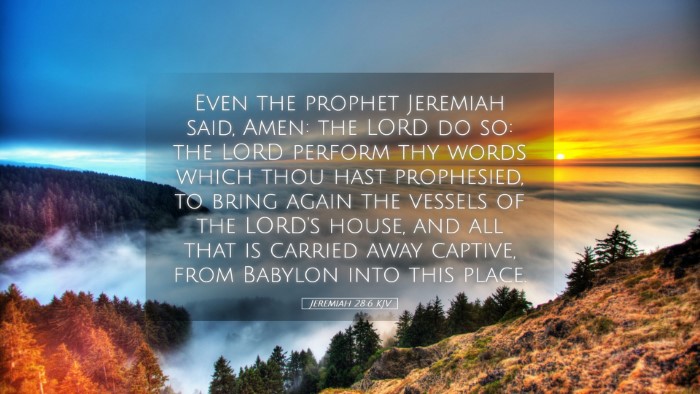Commentary on Jeremiah 28:6
Verse Context: Jeremiah 28:6 states, "And the prophet Jeremiah said, Amen: the Lord do so; the Lord perform thy words which thou hast prophesied, to bring again the vessels of the Lord's house, and all that is carried away captive, from Babylon into this place."
Overview of Jeremiah 28
This chapter features a noteworthy confrontation between Jeremiah and the false prophet Hananiah. In the historical context, this chapter occurs during a time of distress for Judah, where external pressures from Babylon create a dire atmosphere. Hananiah's prophecy stands in stark contrast to Jeremiah's earlier prophetic messages about impending judgment.
Insights from Public Domain Commentaries
Matthew Henry's Commentary
Matthew Henry emphasizes the significance of Jeremiah's reaction to Hananiah's declaration. Recognizing Hananiah as a false prophet, Henry notes that Jeremiah’s "Amen" serves as a reluctant acknowledgment of the desire for restoration, yet he holds onto the truth of God's overarching sovereignty. Jeremiah's response is a poignant reminder of the tensions in prophetic ministry where hope meets harsh reality.
- Truth and Falsehood: Henry points out that while Hananiah speaks of restoration and deliverance, Jeremiah’s historic prophecies focus on judgment and correction. The importance of discerning true prophecy is a recurring theme, highlighting the necessity of testing spirits against the revealed word of God.
- Hope for Restoration: By expressing an "Amen," Jeremiah showcases his faith in God's ultimate plan for His people, even in the face of falsehood. This reflects a powerful hope that contrasts with the human inclination towards despair.
Albert Barnes' Notes on the Bible
Albert Barnes provides a detailed analysis of the implications of Jeremiah’s response. He underscores the declarative nature of prophecy in Israel’s context: that it is not merely predictive but prescriptive as well. Barnes points out that the true prophet must be particularly identified with God’s covenant—the thematic thread seen throughout Israel's history.
- Response to False Prophecy: Barnes notes that Jeremiah's “Amen” suggests that he recognizes God’s desire for His people to return, yet he also acknowledges that Hananiah's words may not be of divine origin. This interaction reflects the challenge of prophecy, where authenticity must override popular sentiment.
- Covenant Faithfulness: Jeremiah's agreement indicates a yearning for restoration, echoing God's commitment to His people. Barnes stresses that true prophetic utterances align with God’s covenantal promises and the call to repentance, which Hananiah's prophecies overlook.
Adam Clarke's Commentary
Adam Clarke approaches this passage with a focus on linguistic and contextual elements, asserting that Jeremiah's “Amen” serves as an expression of hope filled with caution. Clarke reflects on the Hebrew terms and the implications of prophetic legitimacy.
- Language of Prophecy: Clarke explains that the Hebrew term for "Amen" signifies a strong affirmation and an invitation for God to act according to the prophet's words. Jeremiah's use of it should be regarded as layered—embracing hope while also questioning Hananiah's legitimacy.
- Contextual Understanding: Clarke emphasizes the need for context in prophetic declarations, indicating that God’s sovereignty must guide interpretations of prophetic proclamations. It is not merely what is said but the heart behind it that matters significantly in evaluating prophetic soundness.
Theological Implications
This interaction holds significant theological implications. First, it illustrates the tension between human desire and divine reality. Both prophets speak to the people, yet their messages differ dramatically in authenticity and divine backing.
Hope vs. Assurance
In Jeremiah's "Amen," there is an echo of the human heart's desire for hope in restoration. However, it profoundly reflects the caution believers should adopt towards declarations that deviate from biblical truths. The narrative reminds us that God's intentions are sure, even when the current circumstances suggest otherwise.
Assessment of Prophetic Voices
This passage calls pastors, theologians, and scholars to assess the prophetic voices within contemporary contexts, urging discernment and an alignment with the word of God. It addresses the challenge of distinguishing genuine prophecy from false assurance—an enduring struggle throughout biblical history and in today's church.
Conclusion
Jeremiah 28:6 serves as a powerful reminder of the necessity for discernment in the prophetic realm and the hope that is found in God's unchanging nature, despite external tribulations. Jeremiah's response encapsulates the delicate balance between adherence to God's truth and the longing for His restorative work among His people.


